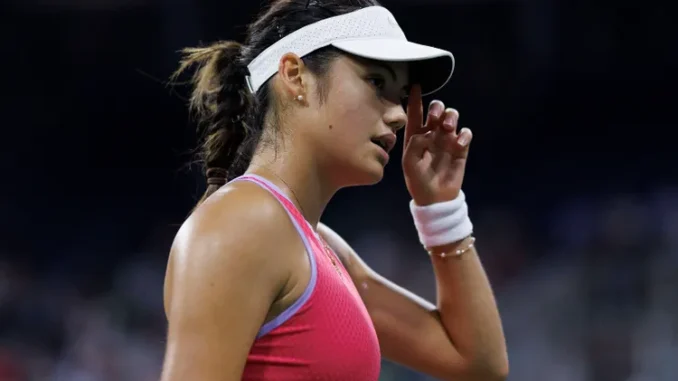
In the high-stakes world of professional tennis, Emma Raducanu, the 22-year-old British sensation and 2021 US Open champion, has once again made headlines with her decision to part ways with her latest coach, Vladimir Platenik, after just 14 days. The split, which occurred on the eve of her first-round victory at the Miami Open, has sparked intrigue and discussion among fans and analysts alike. Platenik, a seasoned Slovakian coach, opened up about the sudden end to their collaboration, sharing insights into Raducanu’s remarkable learning ability and her father Ian’s supportive reaction to the decision. Despite the brevity of their partnership, Platenik’s reflections paint a picture of a talented player navigating immense pressure and a father who remains a steady guiding force in her career.
Raducanu’s journey since her fairy-tale US Open triumph at 18 has been a rollercoaster of highs and lows. Her meteoric rise from a wildcard entrant to a Grand Slam champion captivated the tennis world, but subsequent injuries, inconsistent form, and frequent coaching changes have kept her in the spotlight for reasons beyond her on-court achievements. Platenik, who joined Raducanu’s team just before the Indian Wells Open, was her seventh coach in four years, following the departure of her long-time mentor Nick Cavaday, who stepped down in January 2025 for health reasons. The Slovakian, known for his work with top players like Daria Kasatkina and Dominika Cibulkova, was hired on a trial basis with an expectation to continue through the French Open. However, their partnership ended abruptly after a single match—a straight-sets loss to Moyuka Uchijima at Indian Wells.
Despite the short tenure, Platenik was struck by Raducanu’s potential. “I never had a player who improved as fast as Emma,” he remarked, reflecting on their intensive eight or nine days of training in Florida. The focus was on technical adjustments, particularly her serve and footwork positioning, areas where Raducanu has faced challenges. “We worked a lot on the serve. There was a little problem with the toss… There was also a problem with the second serve,” Platenik noted, highlighting the specific issues they tackled. He described Raducanu’s response as “really positive,” with the young star embracing the new approaches and showing rapid progress in practice sessions. Platenik’s optimism was echoed by Raducanu’s father, Ian, who was “super happy” with the improvements observed during their brief time together.
The decision to end the collaboration came as a surprise to Platenik, who received a phone call from Raducanu the night before her Miami Open match. “Emma said she wanted to pause the collaboration. I understand that she is under a lot of pressure and it’s not easy for her, so I respect her decision,” he said. Raducanu’s management explained that the partnership wasn’t “heading in the right direction,” citing a lack of alignment in vision. For Raducanu, the decision was driven by a need for comfort and familiarity, especially after a distressing incident in Dubai where she was targeted by a spectator exhibiting fixated behavior. “I think the work that we did before the tournament, I mean, it wasn’t long. It was only maybe two weeks, ten days, but we did some really good work,” she said after her Miami victory over Sayaka Ishii. “At the same time, I didn’t feel comfortable, as I wanted to be with someone I knew well.”
Ian Raducanu, a key figure in his daughter’s career, played a pivotal role in Platenik’s hiring. Having previously approached the coach in 2020 and 2021, Ian reached out again after Cavaday’s exit. “I wrote to Ian to ask if they had anyone, as I knew their interest in me was more long-term,” Platenik shared. “Her father wrote back that they didn’t have anyone and would like to try working with me.” When informed of the split, Ian remained supportive, with Platenik recalling, “I told him, it’s okay,” indicating a mutual understanding despite the unexpected end. This exchange underscores Ian’s hands-on approach, a trait that has both fueled Raducanu’s success and drawn scrutiny, with some former coaches suggesting his influence can complicate partnerships.
Raducanu’s frequent coaching changes—seven in four years—have become a defining narrative of her career. Yet, she insists she values loyalty and doesn’t seek constant change. “It has never been my philosophy to chop and change coaches. I’m a very loyal person,” she told reporters, emphasizing that external factors often drive these decisions. Her meticulous approach, characterized by asking probing questions, has occasionally overwhelmed coaches, as she admitted in 2023: “On certain occasions, they haven’t been able to keep up with the questions I’ve asked, and maybe that’s why it ended.” With Platenik, however, the issue seemed more about chemistry than technical shortcomings, as Raducanu prioritized working with familiar faces like LTA coach Colin Beecher and childhood mentor Jane O’Donoghue in Miami.
As Raducanu moves forward, her focus remains on regaining consistency and climbing the rankings, currently at No. 60. Her Miami performance, including a fourth-round run, suggests the technical work with Platenik had a positive impact, even if their partnership didn’t endure. Platenik, for his part, expressed no bitterness, wishing Raducanu well: “Emma is super talented, and I hope she could take some of my advice for the future.” With upcoming events like the Billie Jean King Cup on the horizon, Raducanu’s search for the right coach continues, guided by her determination to find a partnership that balances technical expertise with personal trust. For now, the tennis world watches as this young star navigates the pressures of fame, expectations, and her unyielding pursuit of excellence.
Leave a Reply